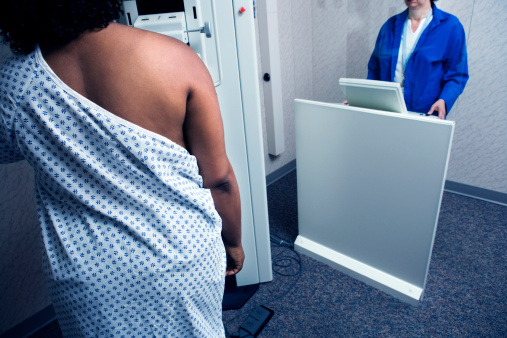
Widely considered one of the best ways to reduce breast cancer risk, annual mammograms have been called into question by one of the most extensive studies ever done on the screening test. On Tuesday, the British Medical Journal published a 25 year-long Canadian study that found that yearly mammography screenings (x-ray exams) do not reduce breast cancer deaths any more so than clinical breast exams (physical exams performed by a doctor.)
This finding is especially significant for Black women, who are 41 percent more likely to die from breast cancer than white women (and less likely to be diagnosed,) as Dr. Janna Andrews told NewsOne.
MUST READ: Why Breast Cancer is More Lethal to Black Women
Nearly 90,000 Canadian women ages 45 to 59 were randomly selected to receive either five annual mammograms or annual clinical breast exams. The results revealed 500 breast cancer deaths among those who received mammography screenings and 505 deaths from breast cancer among those who only had physical exams. Moreover, about one in five of the cancers detected via mammograms were “over-diagnosed.”
“Twenty-two per cent of women with screen-detected invasive breast cancer got treatment that they really didn’t need,” study author Dr. Cornelia Baines told CBC News. “All over-diagnosis results in unnecessary surgery, unnecessary chemotherapy, unnecessary radiotherapy and unnecessary hormonal therapy.”
To be clear, the study advocates women being informed about the benefits and disadvantages of mammography, urging policy-makers to reassess the rationale for screenings.
“The bottom line is that as breast cancer treatment improves, the outcomes of average risk patients diagnosed at an earlier stage thanks to mammography and those diagnosed later due to lack of mammography become similar,” said Baines.
Must Read: Why Breast Cancer Checks Still Save Lives
The major strengths of this meticulous study include its randomized design, intense intervention and complete, long-term follow-up, according to an accompanying editorial titled “Too Much Mammography.” Potential limits of the research, such as a lack of quantitative data in certain areas of the trial period, were also pointed out, but considered unlikely to have made a significant impact overall.
However, in a written response rejecting the study’s conclusion, Daniel B. Kopans, professor of radiology at Harvard Medical School alleged that the mammograms were performed incorrectly by the trials technologists and radiologists and were conducted with second hand machines to “save money.”
“Having been one of the experts called on in 1990 to review the quality of their mammograms I can personally attest to the fact that the quality was poor,” he wrote.
One of the largest and most modern ever conducted, this mammogram study makes a bold claim, given that many experts worldwide, including the U.S.-based National Cancer Institute, advise mammogram screening tests every one to two years to help reduce the number of breast cancer deaths among women ages 40 to 70.
Must Read: Kelly Price Talks Breast Cancer on NewsOne Now
While debate on the usefulness and benefits of mammography screenings is an ongoing one, the fact remains that African-American women are more likely than all other women to die from breast cancer.
No explicit disparities among the ethnicity or race of the study’s participants were mentioned, yet the Office of Women’s Health reports that African-American women’s tumors are found at a later, more advanced stage and are more likely to be diagnosed with a form of breast cancer that spreads more quickly.
So, what does this study mean for African-American women?
Because no method of breast cancer prevention is guaranteed, Black women and their families should remain vigilant and informed on recent developments around this deadly disease.
Keep Up With Rickey Smiley On Facebook!
Why Mammograms Might Not Prevent Breast Cancer was originally published on hellobeautiful.com













